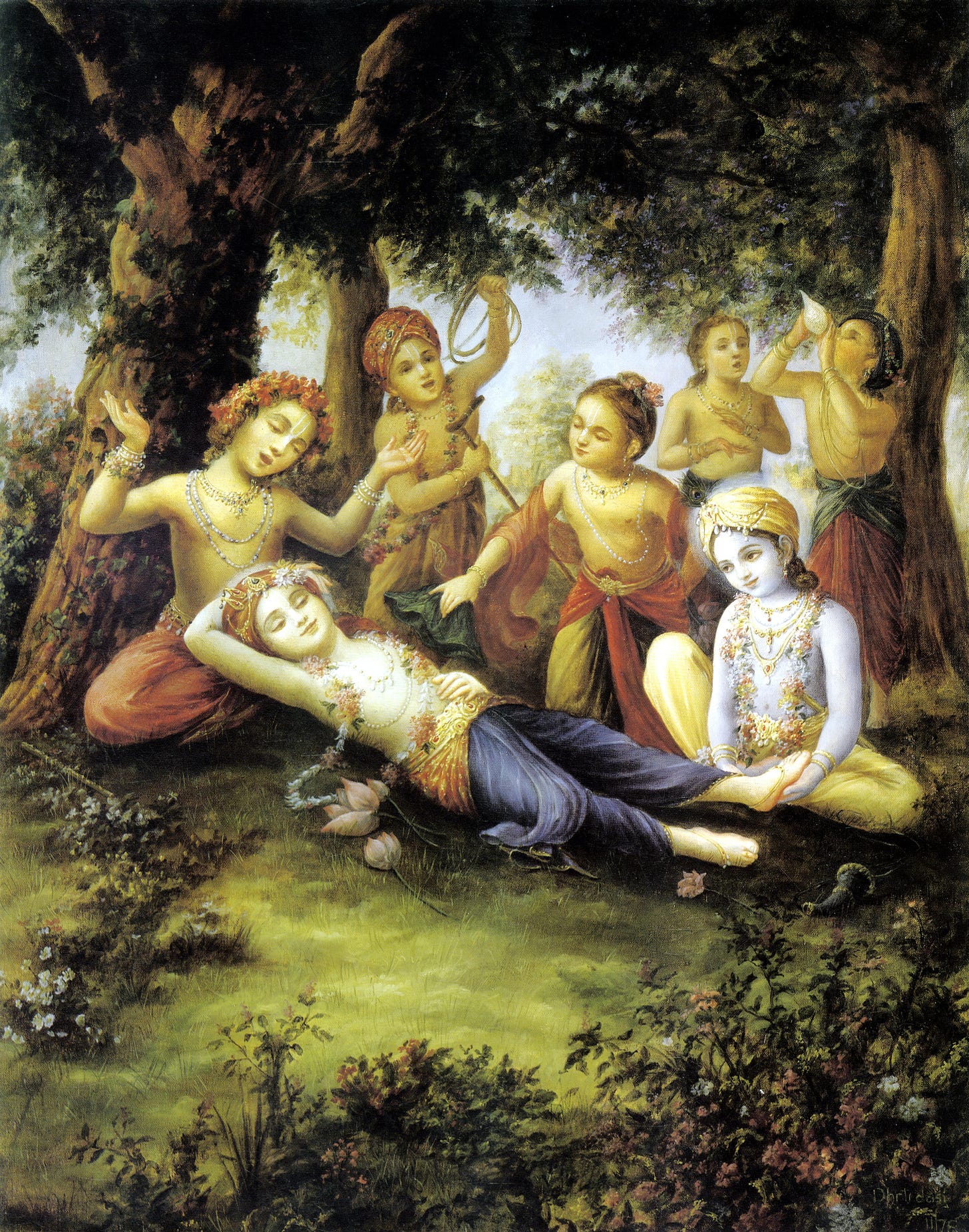How the verses from the scriptures can have unlimited meanings
The verses of the Bhagavad-Gita, and verses of the scriptures in general have unlimited meaning, because they describe Krishna, who is unlimited.
The verses of the Bhagavad-Gita, and verses of the scriptures in general have unlimited meaning. The reason is because they describe Krishna, who is unlimited. All the verses of the scriptures are connected with Krishna and describe some of His transcendental aspects or attributes. However, because each aspect of Krishna is unlimited, each verse contains unlimited meaning. Srila Bhaktisiddhanta Sarasvati Thakura once lectured for a whole month on a single verse of the Srimad Bhagavatam and famously declared that each of the verses could be similarly explained.
The words can be thus explained and expanded unlimitedly. One example of this is that Brahma received only four verses from the Lord (the catur-sloki Bhagavatam) and to explain these four verses, the whole Srimad Bhagavatam was composed. On our planet, the Bhagavatam was revealed by Srila Vyasadeva with 18,000 verses, but on the celestial planets the Bhavatam is much more extensive, and in other universes even more.
Take for example the verse 6.40 of the Gita:
śrī-bhagavān uvāca
pārtha naiveha nāmutra
vināśas tasya vidyate
na hi kalyāṇa-kṛt kaścid
durgatiṁ tāta gacchati
Srila Prabhupada translates it as: "The Supreme Personality of Godhead said: Son of Pṛthā, a transcendentalist engaged in auspicious activities does not meet with destruction either in this world or in the spiritual world; one who does good, My friend, is never overcome by evil."
At first, the verse may appear to speak about pious activities. One could understand it in the sense that one who lives a pious life, defending the right cause will never be defeated by evil. This is surely correct, but there is more.
See for example what Prabhupada mentions in his purport to SB 6.1.19:
"Elsewhere in the Gītā (6.40) the Lord says, na hi kalyāṇa-kṛt kaścid durgatiṁ tāta gacchati: "one who performs auspicious activity is never overcome by evil." The highest kalyāṇa (auspicious) activity is to surrender to Kṛṣṇa. That is the only path by which to save oneself from falling down into hellish life."
The words "auspicious activities" mentioned in the verse are a translation of the term "kalyāṇa". Auspicious and moral activities are certainly kalyāṇa, but the ultimate auspicious activity is devotional service. When we understand it in this sense, the verse gains a completely new meaning.
Devotional service is the ultimate auspicious activity and therefore should be a priority in our lives since nothing else is more beneficial. One who performs devotional service never mets with degradation (na durgatiṁ) which means he or she is always protected by the Lord. Everyone looks for shelter and protection, and devotional service to the Lord is the only true protection we can find in this material world.
The protection of the Lord is so perfect that we are even protected from our own destructive material desires. As Srila Prabhupada explains:
"Śrīla Prabodhānanda Sarasvatī has confirmed this as follows:
kaivalyaṁ narakāyate tri-daśa-pūr ākāśa-puṣpāyate
durdāntendriya-kāla-sarpa-paṭalī protkhāta-daṁṣṭrāyate
viśvaṁ pūrṇa-sukhāyate vidhi-mahendrādiś ca kīṭāyate
yat-kāruṇya-kaṭākṣa-vaibhavavatāṁ taṁ gauram eva stumaḥ (Caitanya-candrāmṛta 5)
The sinful actions of one who has surrendered unto Kṛṣṇa are compared to a snake with its poison fangs removed (protkhāta-daṁṣṭrāyate). Such a snake is no longer to be feared. Of course, one should not commit sinful activities on the strength of having surrendered to Kṛṣṇa. However, even if one who has surrendered to Kṛṣṇa happens to do something sinful because of his former habits, such sinful actions no longer have a destructive effect. Therefore one should adhere to the lotus feet of Kṛṣṇa very tightly and serve Him under the direction of the spiritual master. Thus in all conditions one will be akuto-bhaya, free from fear."
As long as we remain sincere in the path of devotional service, Krishna protects us from material desires by gradually cleaning our hearts, and even if due to weakness we fall at some point, He protects us from degradation, bringing us back to the devotional path, and helping us to persist in our spiritual endeavors. On the other hand, one who rejects the path of devotional service and instead tries to just be an ordinary moral person, in the end gains nothing. As Prabhupada explains:
"“If someone gives up all material prospects and takes complete shelter of the Supreme Personality of Godhead, there is no loss or degradation in any way. On the other hand a nondevotee may fully engage in his occupational duties and yet not gain anything.” For material prospects there are many activities, both scriptural and customary. A transcendentalist is supposed to give up all material activities for the sake of spiritual advancement in life, Kṛṣṇa consciousness. One may argue that by Kṛṣṇa consciousness one may attain the highest perfection if it is completed, but if one does not attain such a perfectional stage, then he loses both materially and spiritually. It is enjoined in the scriptures that one has to suffer the reaction for not executing prescribed duties; therefore one who fails to discharge transcendental activities properly becomes subjected to these reactions. The Bhāgavatam assures the unsuccessful transcendentalist that there need be no worries. Even though he may be subjected to the reaction for not perfectly executing prescribed duties, he is still not a loser, because auspicious Kṛṣṇa consciousness is never forgotten, and one so engaged will continue to be so even if he is lowborn in the next life. On the other hand, one who simply follows strictly the prescribed duties need not necessarily attain auspicious results if he is lacking in Kṛṣṇa consciousness."
Since you came all the way here, click on the like button and help with the algorithm. It doesn't cost anything and helps the article reach more people. Thanks! :)



